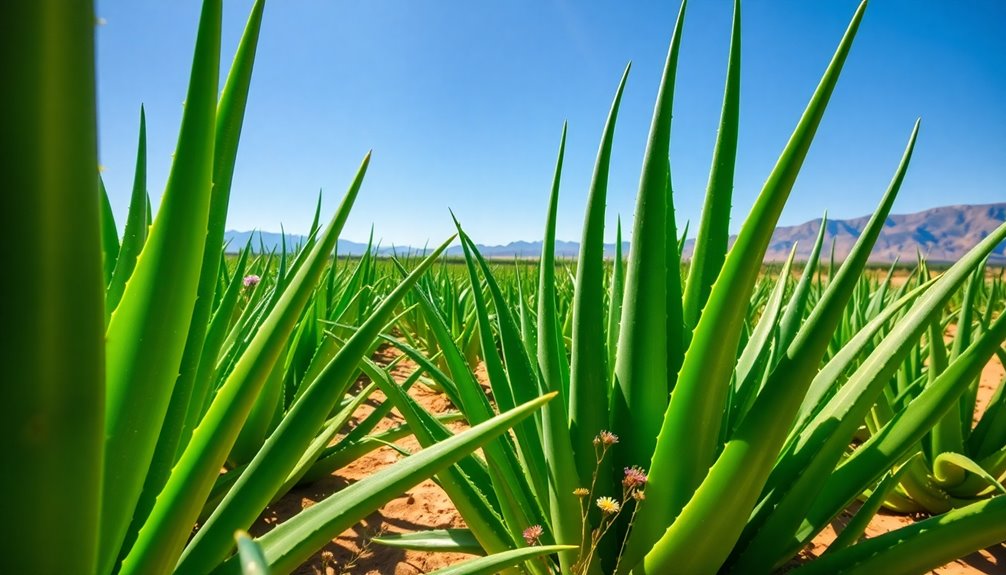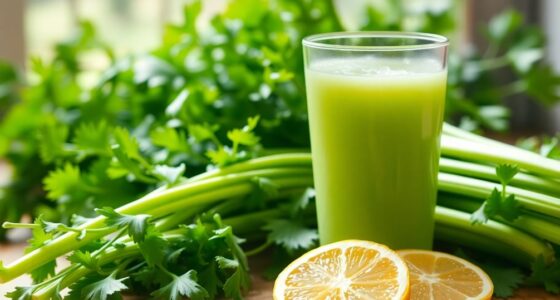Aloe vera thrives in warm, arid climates, with its origins in the Arabian Peninsula. You'll find it growing across the Mediterranean, Coastal Africa, and the Americas. This miraculous plant traveled along ancient trade routes, reaching places like Florida and Mexico. Its cultivation has increased with sustainable practices to meet rising consumer demand. There's a lot more to the story of aloe vera's journey and significance, waiting for you to uncover!
Key Takeaways
- Aloe vera originated in the Arabian Peninsula and has been cultivated for thousands of years across various regions.
- It thrives in warm climates, particularly in areas like Florida, Mexico, and the Dominican Republic.
- The plant is commonly found along trade routes in the Middle East, Coastal Africa, and the Mediterranean.
- Spanish Jesuit priests introduced Aloe vera to the Americas during the 16th century, expanding its geographical reach.
- Aloe vera is now cultivated sustainably, aligning with rising consumer demand for organic and eco-friendly products.
The Ancient Roots of Aloe Vera
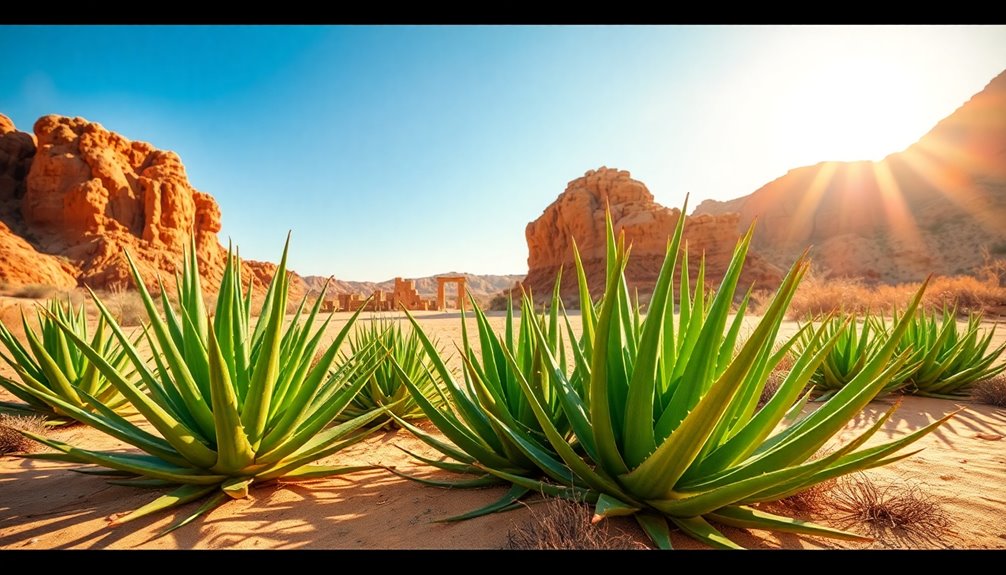
Aloe vera's ancient roots stretch back thousands of years, primarily originating in the Arabian Peninsula. You might be surprised to learn that ancient Egyptians revered Aloe vera as the "Plant of Immortality," using it for beauty and medicinal purposes as early as 4,000 BC.
The history of Aloe vera is rich, with the first written records of its medicinal uses found in Sumerian tablets from around 2200 BC. Renowned figures like Alexander the Great utilized Aloe vera for wound healing, showcasing its significance in ancient medicine.
As trade routes expanded across the Mediterranean and Coastal Africa, Aloe vera's fame grew, embedding itself into various cultural practices. Its enduring legacy continues to captivate us even today.
Aloe Vera's Journey Through History
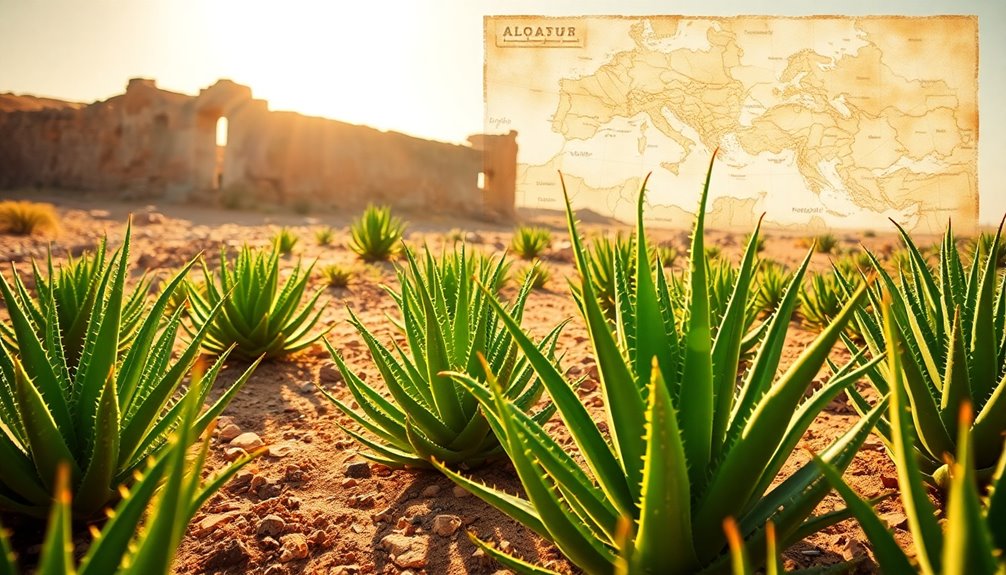
From its early reverence in ancient Egypt to its widespread use today, Aloe vera's journey through history is nothing short of fascinating.
Believed to have originated in the Arabian Peninsula, this remarkable plant, scientifically known as Aloe barbadensis miller, quickly made its way to Mediterranean regions.
The Sumerians first recorded its medicinal use around 2200 BC, describing it as a natural laxative.
Ancient Egyptians dubbed Aloe vera the "Plant of Immortality," using it in beauty rituals and burial practices, as documented in the Papyrus Ebers.
Historical figures like Alexander the Great and Christopher Columbus recognized its health benefits, introducing it to the Americas during the 16th century.
Geographical Spread and Cultivation

The geographical spread of Aloe vera showcases its adaptability and resilience across diverse climates.
Believed to have originated in the Arabian Peninsula, Aloe vera was historically cultivated along trade routes in the Middle East, Coastal Africa, and the Mediterranean.
By the 16th century, Spanish Jesuit priests introduced the plant to the Americas, where it found a home in warm climates like Barbados and Curacao.
Today, you'll find Aloe vera thriving in regions with similar conditions, particularly in Florida, Mexico, and the Dominican Republic.
This widespread cultivation has led to significant commercial cultivation, contributing to a global market valued at around $13 billion, underscoring Aloe vera's crucial role in health and beauty industries.
Cultural Significance Across Continents

Aloe vera's cultural significance spans across continents, showcasing its revered status in ancient Egypt, where it was linked to beauty and immortality.
You'll find that indigenous healing traditions in places like India celebrate its sacred qualities, while the plant's journey along trade routes has amplified its global reputation.
This fascinating history reveals how aloe vera became a symbol of healing and resilience in various civilizations.
Ancient Egyptian Reverence
While many plants have held significance in ancient cultures, few can rival aloe vera's revered status in ancient Egypt, where it was honored as the "Plant of Immortality."
This extraordinary plant wasn't just a beauty staple for queens like Cleopatra and Nefertiti; it played an essential role in health rituals and medicinal practices.
The medicinal properties of aloe were astonishing, including:
- Healing wounds and skin conditions
- Anti-bacterial and anti-fungal effects
- Key ingredient in embalming processes
- Included in burial offerings for pharaohs
Aloe vera's sacredness transcended Egypt, resonating with ancient Indian cultures and beyond.
Its legacy of healing and resilience continues to inspire admiration across continents, proving its timeless significance.
Indigenous Healing Traditions
Across various cultures, aloe vera has woven itself into the fabric of indigenous healing traditions, often celebrated for its remarkable properties.
Ancient Egyptians revered aloe vera plants as the "Plant of Immortality," using them for medicinal purposes and beauty routines.
In 16th-century India, aloe vera was one of the 16 holy plants essential to spiritual and healing rituals.
The Maya Indians famously dubbed its juice the "Fountain of Youth," reflecting their beliefs in rejuvenation.
Historical figures like Christopher Columbus harnessed aloe vera's healing abilities for wound treatment.
Additionally, Traditional Chinese Medicine recognizes aloe vera as lu hui, employing it for detoxifying and skin conditions, showcasing its widespread acceptance in diverse indigenous healing practices across continents. Emotional dysregulation is often addressed through natural remedies like aloe vera in various cultural contexts.
Global Trade Impact
The global trade of aloe vera has transformed its status from a revered plant in ancient cultures to a staple in modern health and beauty markets.
Once celebrated in ancient times, the aloe vera plant is now a miracle plant embraced worldwide. Its journey across continents is filled with cultural significance, especially in regions like South Africa and the Middle East. This versatile plant has been used for centuries not only for its soothing gel but also for its extensive medicinal benefits. In addition to its culinary applications, many cultures value the aloe vera healing properties for promoting skin health and aiding digestion. As a result, contemporary wellness trends have led to a resurgence in interest, as people increasingly seek natural remedies to enhance their well-being.
Consider these emotional connections:
- Healing traditions rooted in ancient rituals.
- Culinary uses that span generations.
- Commercial use in luxurious skincare products.
- Economic opportunities for farmers worldwide.
With the global market for aloe vera products projected to reach $13 billion, its legacy continues, thanks to the efforts of explorers and Jesuit priests who introduced it to new lands.
Modern Applications and Commercialization
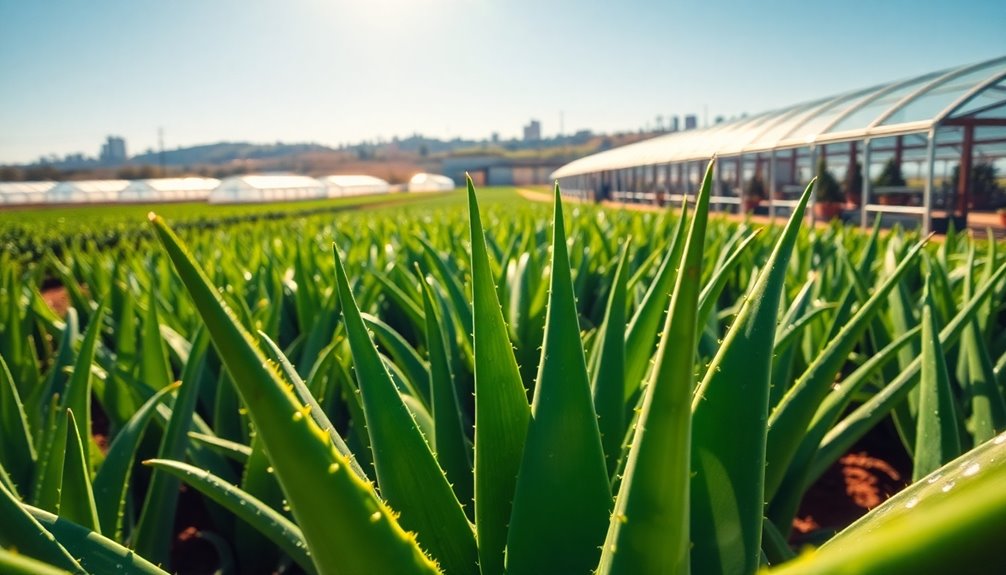
Aloe vera's popularity in skincare and dietary supplements has skyrocketed, making it a staple ingredient in many products you might already use.
With the market growing rapidly, you'll find aloe vera incorporated into everything from moisturizers to health drinks.
As you explore these modern applications, you'll see why this ancient plant remains relevant today.
Aloe Vera in Skincare
As you explore the world of skincare, you'll quickly discover that aloe vera stands out as a powerhouse ingredient in modern formulations. This medicinal plant boasts incredible soothing and healing properties, making it essential in numerous beauty treatments.
Here are four reasons to embrace aloe vera in your skincare routine:
- Topical Use: It effectively treats burns, cuts, and skin irritations.
- Hydration: Aloe vera provides natural moisture, enhancing skin health.
- Anti-inflammatory: It calms redness and irritation, promoting an even complexion.
- Celebrity Endorsements: Influencers rave about its benefits, boosting its popularity.
Additionally, its efficacy in promoting vibrational alignment with wellness makes aloe vera a sought-after ingredient in holistic skincare approaches. With its integration into the booming skincare market and even health drinks, aloe vera continues to redefine beauty and wellness, proving it's more than just a trend.
Dietary Supplement Uses
With a global market value estimated at around $13 billion as of 2012, aloe vera has carved out a significant niche in the dietary supplement industry.
For thousands of years, people have recognized the health benefits of this remarkable plant.
Today, many modern aloe vera products are used to treat gastrointestinal issues, thanks to its properties that promote gut health. The gel contains bioactive compounds like vitamins, minerals, and amino acids, making it a popular choice in dietary supplement applications.
Research suggests that aloe vera may also support immune function and improve nutrient absorption, enhancing overall well-being. Additionally, aloe vera's nutritional guidelines highlight its significance in promoting digestive health and overall wellness.
Whether in juices or capsules, aloe vera remains a go-to natural remedy for health-conscious consumers seeking wellness solutions.
Market Trends and Growth
While the popularity of aloe vera has surged, driven by its versatile applications in health and beauty, the market continues to expand rapidly.
You'll find that the global market for aloe vera products was worth an impressive $13 billion in 2012. The growth can be attributed to:
- Increased consumer demand for natural ingredients.
- Celebrity endorsements boosting product visibility.
- Advanced processing techniques enhancing product quality.
- Expansion of plantations in regions like the Americas and Asia.
These trends highlight aloe vera's recognized healing properties, making it a key ingredient in skincare, haircare, and dietary supplements. Additionally, the shift towards eco-friendly materials in product formulations reflects a broader consumer preference for sustainable options.
As more consumers seek out natural solutions, aloe vera's presence in the global market is set to grow even further.
The Future of Aloe Vera Cultivation
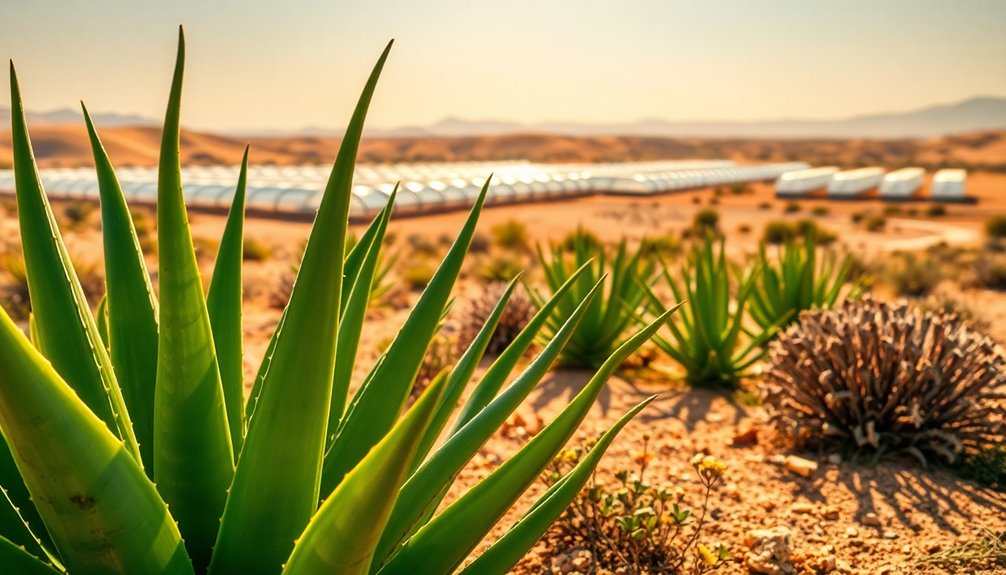
The future of aloe vera cultivation looks promising, especially as consumer demand for natural and sustainable products continues to grow.
You'll find that cultivated aloe vera is thriving in arid climates like the Arabian Peninsula and Mexico, where its resilience shines.
Advances in sustainable farming and organic farming practices are enhancing the efficiency and yield of these crops, making them more appealing to eco-conscious consumers.
Additionally, ongoing research in aloe vera processing has improved the stabilization of aloe gel, ensuring that its health benefits are preserved in various products.
As interest in natural remedies and holistic health rises, expect to see more local sourcing and organic options, aligning with your desire for sustainable, high-quality aloe vera products. Furthermore, the increasing popularity of essential oils for aromatherapy is likely to complement aloe vera's use in wellness applications.
Frequently Asked Questions
Where Is the Origin of the Aloe Vera Plant?
The origin of the aloe vera plant is believed to be the Arabian Peninsula. It thrived in arid conditions, which helped it adapt to various dry climates.
As trade routes emerged, aloe vera spread throughout the Middle East, Coastal Africa, and the Mediterranean.
You can trace its historical significance back to ancient Egypt, where carvings from around 6,000 years ago highlight its long-standing presence and importance in the region.
Where Does Aloe Vera Grow?
Aloe vera thrives in warm climates, with the global market valued at about $13 billion, showcasing its immense popularity.
You'll find it growing in arid regions, particularly in North Africa, the Mediterranean, and parts of the Arabian Peninsula.
It's also widely cultivated in places like Mexico, Florida, and the Caribbean, where its health benefits and commercial value drive its growth.
This versatile plant adapts well to sandy, dry soils, making it easy to cultivate.
Where Did the Aloe Vera Tree Come From?
You might be surprised to learn that the aloe vera plant originated in the Arabian Peninsula.
This remarkable plant has been cherished for thousands of years, especially in ancient Egypt, where it was dubbed the "plant of immortality."
As you explore its history, you'll find that it spread through trade routes across the Middle East, Africa, and the Mediterranean, eventually reaching the Americas in the 15th century through Spanish and Dutch explorers.
What Does Aloe Vera Do to a Woman's Body?
Aloe vera offers numerous benefits for your body. It soothes burns and skin irritations, helping you maintain healthy skin.
With vitamins A, C, and E, it can reduce signs of aging, giving you a youthful glow. Its anti-inflammatory properties might alleviate menstrual cramps and hormonal discomfort.
Drinking aloe vera juice supports digestion, easing bloating and irregular bowel movements. Plus, it's believed to help balance hormones, promoting regular cycles for those with conditions like PCOS.
Conclusion
In exploring Aloe Vera's fascinating journey, you've uncovered its rich history and global significance. Did you know that around 200 species of Aloe exist, but only Aloe Vera is widely cultivated for its medicinal properties? This remarkable plant not only connects cultures but also serves as a demonstration of nature's resilience and versatility. As you consider its future, remember that Aloe Vera isn't just a plant; it's a symbol of healing that spans centuries and continents.
Cindy thoroughly researches juicing trends, techniques, and recipes to provide readers with practical advice and inspiration. Her writing style is accessible, engaging, and designed to make complex concepts easy to understand. Cindy’s dedication to promoting the advantages of juicing shines through her work, empowering readers to make positive changes in their lives through the simple act of juicing.

